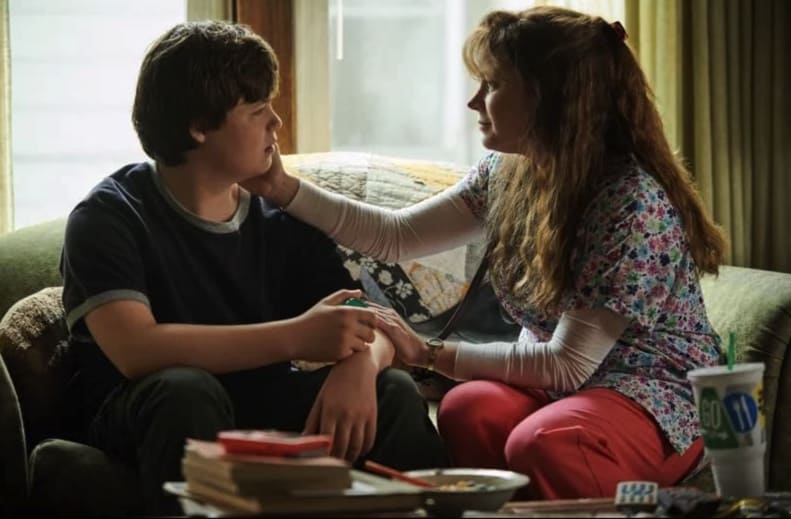This article contains some spoilers for Parasite (2019) and Hillbilly Elegy (2020)
Netflix’s recent drama Hillbilly Elegy has gotten a lot of flack for its portrayal of poverty in rural America: critics have called it “exploitative”, “condescending”, “terrible”, and claim that it creates “anthropological distance, not human empathy”. A recent article in America (our sponsor organization) asked whether it might constitute “poverty porn”.
Contrast that with the response to another movie about a poverty-stricken family, 2019’s blockbuster Parasite, which had the critics hailing it as an “epic lesson in class warfare”, “a riotous social satire”, and saying that it “dissects themes of class warfare and rigged systems in a wholly original way”.
All of these reviews start from the unwritten premise that systemic political change should be the goal of any film that deals with poverty. They miss a more fundamental distinction between these two excellent works of art — the worldview from which they were created.
On the surface, there are similarities between the Appalachian memoir and the Korean comedy — both are stories of bootstrapping young men whose financial fortunes lead to questions of identity and belonging. Both are family dramas of suffering and struggle with poverty. Both admit the systemic difficulties faced by the poor. But Hillbilly Elegy offers a hopeful vision of what people can do in the face of challenges, where Parasite leaves little hope beyond violent revolution.
The biggest difference is belief in something beyond the material. Parasite is marred in this world of things and sees the struggle to get stuff as the primary aspect of the human condition. The capitalistic economic system is problematic because certain classes of people cannot attain material success, thus the situation is hopeless. Violence is the inevitable result because people cannot help but resent those who have more than them.
For Hillbilly Elegy, there is a realm beyond the material, where love and relationships are most important, without reference to material goods. Material goods are necessary means for success in life but they are not constitutive of that success. Although the references to God are fleeting, there is a sense of an eternal perspective in Hillbilly Elegy that is absent in Parasite.
*****
In Parasite, the Kim family is driven by the need to make money. The unemployed college-aged son finds a position as a temporary English tutor to a very wealthy family, the Parks. Gradually his sister, father, and mother end up working for the family as art therapist, driver, and housekeeper respectively. Meanwhile, the Park family is oblivious of their relation to one another and utter lack of credentials.
Of course, the story of the Kim family begins from a state of desperation as they scrounge for food in their basement apartment. But as they infiltrate the rich family’s home, their goalposts shift quickly from feeding themselves to opulence. In the climatic scene of the first half of the movie, they get drunk on imaginations of what life will be like when they own the house.
*****
At the beginning of Hillbilly Elegy, Ohioan J.D. Vance is a Yale law student preparing for internship interviews and suffering from imposter syndrome. His big-break opportunity at a fancy dinner is interrupted by a call from his older sister telling him that their mother had overdosed again. The film flashes back and forth between J.D.’s childhood and his return to Middletown, Ohio, to help his long-suffering mother.
In a distinctly American way, wealth and poverty are a motif in Hillbilly Elegy, but Vance’s story is far more focused on love and family and how money plays a complex role in our lives. For example, in one scene, the young J.D. turns away from drugs and apathy when he sees his grandmother, “Mamaw”, asking for more food from the Meals on Wheels service so she can feed him. Her poverty led to his conversion.
In another scene, J.D. attempts to steal a TI-89 calculator from RadioShack so Mamaw has to lay some tough love on him, but also ends up buying him the calculator, an act of love which is impossible for the rich.
*****
The Kims also clearly love each other and value family, but quickly resort to fraud and theft, greed and violence in their pursuit of wealth and status. Money for them is to be acquired at nearly all costs. They are willing to sacrifice to make each other happy, but even that happiness is defined only in terms of material prosperity.
One might accuse Hillbilly Elegy of naivete for offering a vision of the American Dream that rings hollow to so many poor families. Perhaps the over-the-top violence of Parasite feels more authentically capitalistic. But Hillbilly Elegy resists the claim that one need only work hard and sacrifice then worldly success will follow. Mamaw puts it:
“You gotta take care of business; you gotta go to school; you gotta get good grades, to even have a chance… I’m talking about a chance. You might not make it, but you sure as hell won’t if you don’t try.”
If both the Kims and the Vances think that the probability of pulling themselves out of poverty is low, what is different about their approaches? One difference might be their tolerance for vice — the Kims aren’t above stealing and manslaughter, but the Vances only tolerate domestic abuse and drugs. Neither family is quite the model of moral rectitude.
The true difference is this: The Kim family wants to be rich. The Vance family wants to be happy. Those goals are not mutually exclusive, but human beings were not made simply for material success. It’s perfectly natural to desire wealth as a means to supporting your family or expressing your creativity, as in Hillbilly Elegy, but when we lose sight of a higher goal, we will suffer the violence, separation, and imprisonment that concludes Parasite.
Image from IMDb


